Glow Green

 Homepage
Homepage 
IntroductionBreakdown of CostsPrice Range Based on System SizeCost of Solar Panels in the UKHow are Solar Panel Prices Calculated?What Makes Up The Cost of Installation?Cost of Solar Panels Over TimeAdditional Solar Panel CostsEstimating Energy RequirementsSolar Panel Cost CalculatorSolar Panel Costs FAQ
IntroductionBreakdown of CostsPrice Range Based on System SizeCost of Solar Panels in the UKHow are Solar Panel Prices Calculated?What Makes Up The Cost of Installation?Cost of Solar Panels Over TimeAdditional Solar Panel CostsEstimating Energy RequirementsSolar Panel Cost CalculatorSolar Panel Costs FAQ
Solar energy is making a splash as the new 'it' kid on the renewable energy block. It's like the Beatles of the power world, but instead of 'Help!', it's helping homeowners across the UK save a pretty penny. With electricity prices going up faster than a Yorkshire pudding in the oven[1], you might be casting about for ways to trim your energy bills and give a nod to Mother Nature at the same time.
Now, solar panels aren't some fly-by-night solution -- they're in it for the long haul. They bring clean, renewable energy right to your doorstep. A nifty solar system can shoulder more of your home's energy needs, reducing the amount of electricity you have to buy from your supplier. This not only keeps you safe from the bite of rising energy prices[2], but also leaves you with a bit more jingle in your pocket.
And here's the cherry on top: you could potentially sell a hefty chunk of that energy back to the National Grid[3]. Over time, these savings can add up to a tidy sum that would make even a Yorkshireman crack a smile.
But before you dive into the solar pool, it's important to understand the costs involved, how prices are determined, and get to know the price range for different system sizes. So let's take the plunge and explore the costs and prices of solar panels in the UK for 2024. By the end of this, you'll have enough information to make energy decisions that would impress even the most frugal of your pals.
When it comes to the cost of solar panels, there's more to it than just the panels. The cost of solar panels isn't a one-item affair - you've also got to factor in the maintenance charges and the price of all those fiddly bits like solar panel inverters.
The installation cost is no small potatoes - it makes up a sizeable portion of the overall bill, so you'd best make room for it in your budget. Other things that can nudge the price needle include the type of panels you fancy, the cost of labour, the size of the system you need, and whether you decide to throw in solar batteries into the mix.
The more extras you add, the more you'll have to shell out.
When it comes to solar panel systems, the price tag can swing as wildly as a British summer. You see, size matters when it comes to solar panels. Smaller systems, which require fewer panels, are typically lighter on the wallet. For an average family of four (which, let's be honest, uses energy like it's going out of fashion), a suitable system might cost somewhere between £5,000 and £8,000. But remember, prices can fluctuate faster than a cup of tea cools down on a cold day, especially when we're talking about the specific size of the system, measured in kilowatts (kW) [3][4].
Now, if you're after the people's favourite, look no further than the 4kW system. This little beauty, which usually consists of about 10 panels, will set you back roughly £7,000 [2]. But fear not, it can generate a whopping 3,750 kilowatt-hours of electricity each year, enough to keep the kettle boiling for many a brew [1].
Remember, though, as the size of the system grows, so does the price. So, while you're crunching those numbers and considering potential expenses, be sure to factor in just how big a system you'll need. After all, nobody likes a surprise when it comes to bills, do they?.
| Cost Factor | Description | Cost |
|---|---|---|
| System Size | The cost per kWp and examples for different house sizes. | £2,246 per kWp 2.1 kWp system (1-2 bedroom house): £4,700 4.9 kWp system (4-5 bedroom house): £11,000 |
| Type of Panels | The cost of monocrystalline and polycrystalline panels. | Monocrystalline: £1.60 to £2 per watt Polycrystalline: £1.20 to £1.60 per watt |
| Installation Process | The cost of professional installation. | Average: £1,500 |
| Additional Components | The cost of extras like solar batteries or pigeon proofing. | Solar battery: £1,200 - £6,000 Pigeon proofing: £150 - £300 |
| Location and Labour Costs | The cost of labour, which can vary based on location. | Average: £200 - £400 per day |
Think of solar systems like a trip to the supermarket. Smaller shopping lists (or systems) will cost less because they require fewer items (or panels). For a typical family of four (mum, dad, two kids, and let's throw in a goldfish for fun), you might be looking to pay somewhere between £5,000 and £8,000 [3]. Of course, these prices can change depending on the size of your solar system, which is measured in kilowatts (kW).
The price tag for a 4KW system typically falls between £6,000 and £8,000 [1][5]. But don't be fooled by the price tag, this system is a workhorse, generating around 3,400 kilowatt-hours of electricity each year [2]. That's a nifty little fact to keep in mind when you're doing your budgeting prep.
The most common solar panel system sizes in the UK are 3 kW, 4 kW, and 5 kW [1]. The 4 kW system size seems to be the most popular according to GreenMatch's research [2].
| System Size (kW) | Suitable House Size | Estimated Cost | Annual Energy Generation (kWh)[1] | Average Consumption (kWh)[2] | Expected Export Amount (kWh)[4] | % of Energy Usage from Solar[4] |
|---|---|---|---|---|---|---|
| 3.0 | 3-bedroom house | £4,716 - £7,074 | 2,550 | 4,600 | 1,050 | 55% |
| 4.0 | 4-bedroom house | £6,288 - £9,432 | 3,400 | 6,200 | 1,400 | 54% |
| 5.0 | 5-bedroom house | £7,860 - £11,790 | 4,250 | 7,800 | 1,750 | 54% |
Please note that these are approximate figures and actual values may vary based on various factors.
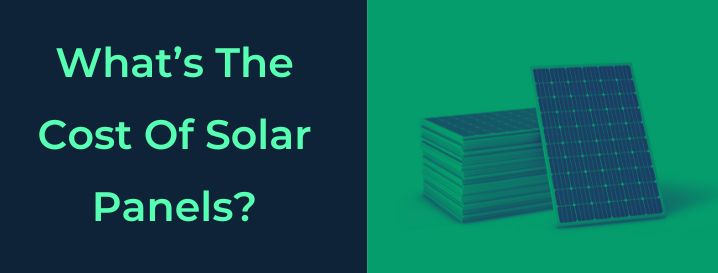
Navigating solar panel kits in the UK might seem a bit like a tea-time quiz show - exciting, but a bit confusing. Especially when it comes to costs. But fear not! We've done the legwork and lined up our top 10 solar panels on the market. From budget-friendly options to high-end models, we've got you covered. So, buckle up and let's take a ride.
| Brand | Model | Power | Efficiency | Warranty | Price/Watt | Panel Price |
|---|---|---|---|---|---|---|
| Perlight | N-Type | 430W | 22.8.0% | 30 years product, 30 years 87.4% performance | £0.52 | £225 |
| Perlight | Delta | 415W | 21.2% | 30 years product, 30 years 82.05% performance | £0.43 | £180 |
| Trina Solar | Vertex S | 405W | 21.0% | 25 years product, 30 years 87.6% performance | £0.49 | £225 |
| SunPower | Maxeon 3 | 400W | 21.2% | 25 years product, 30 years 92% performance | £0.65 | £290 |
| LG | NeON R Prime | 365W | 21.1% | 25 years product, 30 years 85% performance | £0.58 | £250 |
| JA Solar | DeepBlue 3.0 | 430W | 21.0% | 15 years product, 30 years 87% performance | £0.44 | £220 |
| Q Cells | Q.Peak Duo L-G5.2 | 340W | 19.4% | 25 years product, 30 years 87% performance | £0.47 | £180 |
| Jinko | Eagle 72M | 455W | 20.8% | 15 years product, 30 years 87.2% performance | £0.41 | £210 |
| Canadian Solar | HiDM5 | 410W | 20.6% | 15 years product, 30 years 87.2% performance | £0.43 | £195 |
| Longi Solar | LR5-72HPH | 435W | 19.9% | 15 years product, 30 years 87.5% performance | £0.42 | £210 |
Let's paint a picture. Imagine a four-bedroom house, filled with the hustle and bustle of family life. It typically munches through about 5,300 kWh a year[1].
Now, plop a 4kW solar panel system into the mix.
This silent energy hero can whip up around 3,400 kWh each year [2], covering about 64% of your energy needs.
Not bad, eh? It's like having a free energy butler serving up solar power on a silver platter!
So, what's 64% of your energy bill worth to you?
The efficiency, and the total number you need play the biggest part in this calculation. So, if you pick high-efficiency, top-of-the-range panels in large quantities, your it's going to cost more.
On the flip side, if you go for the basic, yet still effective panels and need fewer of them, your bill will be lighter.
Either way, you're in control of what make up your solar panel system and its cost.
Deciding on the type of solar panel might seem like choosing between tea and coffee in the morning. Both will do the job, but each has its own flavour and cost.
Monocrystalline panels are like your gourmet coffee - a bit pricier, but they pack a punch in efficiency and make the best use of space. They're the 'treat yourself' option of solar panels.
On the other hand, polycrystalline panels are like your classic cup of tea. They might not have the same 'oomph' as monocrystalline panels, but they're more wallet-friendly, making them a popular choice for budget-conscious homeowners.
As you sip on this decision, remember to balance the initial price against the long-term savings. After all, it's not just about how much you spend now, but how much you could save in the future. Now, isn't that a refreshing thought?
| Panel Type | Average Cost per Watt[1] |
|---|---|
| Monocrystalline | £1.10 - £1.60 |
| Polycrystalline | £0.80 - £1.10 |
These values reflect the current market prices in 2024.
Sources: [1]
When we talk about efficiency in solar panels, we're not referring to their ability to multitask or meet deadlines. No, we're talking about how well they can transform sunlight into electricity.
As a rule of thumb, the more efficient a panel is, the more it can make sunlight do the electric slide. However, these high-efficiency panels tend to ask for a bigger upfront investment.
Here's the silver lining: investing in high-efficiency panels could mean more significant savings on your electricity bills over time.
When considering efficiency, it's important to keep your household's energy needs in mind. Why? Because the higher the efficiency, the more energy output from your system. Think of it as getting more juice from the same squeeze. That's the beauty of efficiency!
| Panel Type | Average Efficiency[1] | Estimated Annual Energy Output (for 4kW system)[1] |
|---|---|---|
| Monocrystalline | 17-22% | 3,820 - 5,000 kWh |
| Polycrystalline | 15-18% | 3,360 - 4,080 kWh |
Sources: [1]
Homes with a bigger appetite for energy will naturally need more panels. More panels will bump up the overall cost of the system. It's all about getting the portion size right - too little and you'll be left wanting, too much and you've overspent.
Getting the number of panels spot on ensures your system can generate enough electricity to keep your home powered up.
The number of panels you'll need is a key ingredient in cooking up the cost of your solar panel system.
To help you get your head around it, let's use a typical four-bedroom house in the UK as an example. Let's say it has an annual energy consumption of about 5,300 kWh. Here's how the number of panels might look for different panel types:
| Panel Type | Average Efficiency[3] | Estimated Annual Energy Output (for 4kW system)[2] | Approximate Number of Panels Needed[1] |
|---|---|---|---|
| Monocrystalline | 20% | 3,600 - 4,800 kWh | 10 - 16 |
| Polycrystalline | 15% | 3,120 - 3,840 kWh | 10 - 16 |
Monocrystalline solar panels in 2024 have an average efficiency of around 20% [3], and a 4kW system can produce a varying amount of electricity based on several factors [2]. However, considering the average power output of solar panels, it's fair to estimate a range similar to your original figures. As for the number of panels needed for a 4kW system, it depends on the wattage of the individual panels, but panels typically produce between 250 and 400 watts each [1]. So, for a 4kW system, you'd need between 10 and 16 panels.
Polycrystalline solar panels, on the other hand, have about 5% less efficiency than monocrystalline panels [5], bringing their average efficiency to around 15%. The energy output and number of panels needed would be similar to monocrystalline panels, albeit slightly higher due to the lower efficiency.
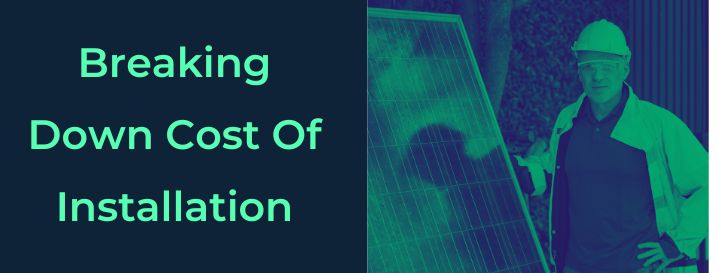
Alright, let's roll up our sleeves and dive into the nitty-gritty of solar panel installation costs, shall we? It's not all about the panels, you know. There's more to it.
Now the cost of the materials generally falls somewhere between £2,000 and £5,000. No, not small change you'd find under your couch cushions, but think about it this way: it's the cost of a really good holiday, only this holiday helps cuts down your electricity bill.
According to the Energy Saving Trust, a typical home solar PV system costs about £6,000. That means the materials make up roughly 35%-70% of the total cost, depending on your specific needs and the quality of your materials.
Here's a breakdown of what you might expect to pay for different components:
| Component | Estimated Cost [1] |
|---|---|
| Solar panel (350W) | £786 |
| Solar panels System (3.5 kWp) | £7,860 |
| Inverter | £800 - £2,000 |
| Mounting hardware | £200 - £700 |
| Wiring and electrical supplies | £100 - £300 |
Sources: [1]
Why bring in the pros for the installation? Well, having an expert guide you ensures you're doing everything correctly and safely. With professionals, you can rest easy knowing your solar panels will be fitted just right, minimising the risk of any 'oops' moments during the installation.
According to the Renewable Energy Hub, installation accounts for around 15% of the total cost. But remember, a cheaper installation might not always be the best route. It's like going for the cheapest tattoo artist - you'll save money, but you might not be thrilled with the results.
So, hiring professionals might seem like an additional expense, but it's an essential part of the process. After all, you wouldn't want your brand new panels to be installed wonky, would you?
| Installation Size | Estimated Labour Cost[1][2] |
|---|---|
| Small (1-2 kW) | £600 - £1,000 |
| Medium (2-3 kW) | £900 - £1,500 |
| Large (3-4 kW) | £1,500 - £2,200 |
On average, the installation process takes between 1 and 3 days1. Just as every journey has its unique aspects, the duration of your solar installation will be influenced by factors such as the layout of your roof, the number of solar panels, and the expertise of the installation team.
Here's an invigorating fact - in 2023, the UK is setting new records in solar installations. A staggering 138,336 installations have been documented since 2022, eclipsing the former record of 137,926 installations set in the previous year [1]. It's as if every month of 2023 is trying to outdo its predecessor in terms of solar installations [2]. The UK is not just embracing solar energy, it's setting the pace.
| System Size | Estimated Installation Time[3][4] |
|---|---|
| Small (1-2 kW) | Less than 1 day |
| Medium (2-3 kW) | 1-2 days |
| Large (3-4 kW) | 2-3 days |
Please note that these are rough estimates and the exact time can vary from one installation to another.
Solar panels have been evolving like the fine piece of technology they are, becoming more affordable while increasing in efficiency. According to Architectural Digest, solar panels have seen an 82% price reduction over the last decade [1].
In 2010, the cost of a watt from solar panels was roughly the price of a high-end coffee in London. By 2020, it had become as accessible as a daily cup of your favourite home-brewed blend [1].
| Year | Average Cost per Watt (£)[2] | Average Panel Efficiency (%) |
|---|---|---|
| 2010 | £1.75 | 15% |
| 2011 | £1.28 | 16% |
| 2012 | £0.72 | 16.5% |
| 2013 | £0.64 | 17% |
| 2014 | £0.64 | 17.5% |
| 2015 | £0.56 | 18% |
| 2016 | £0.56 | 18.5% |
| 2017 | £0.40 | 19% |
| 2018 | £0.24 | 19.5% |
| 2019 | £0.24 | 20% |
| 2020 | £0.16 | 20.5% |
You've got to account for maintenance, occasional cleaning, and the unexpected repair now and then. When tallying up the full cost of your solar panel system, these factors should be part of the equation.
Think of regular maintenance as a routine visit to your dentist. It's all about keeping your panels in peak condition and can even help extend their lifespan. But, as with oral hygiene, sometimes complications occur. You might have to mend a broken panel or swap out a malfunctioning part, adding a few extra pounds to your overall expenditure.
The solar panel inverter is a bit like the brain of your solar panel system. It takes the direct current (DC) that your panels produce and turns it into the kind of electricity that powers your telly, fridge, and all the other gadgets around your house.
The price for a solar panel inverter can sit anywhere between £1,000 and £3,200. It all depends on what type and size of system you're going for. But here's the thing: a good quality inverter can really make a difference. It makes sure that the conversion of solar energy is as efficient as possible, so you get the most out of your system. It's like getting the most juice out of an orange - you wouldn't want to miss a drop, right?
| Inverter | Efficiency (%) | Price Range (£) |
|---|---|---|
| SolarEdge HD-Wave | 99% | £1,500-£2,5001 |
| SMA Sunny Boy | 97% | £950-£1,6002 |
| Enphase IQ7+ Microinverter | 97% | £1,300-£1,7003 |
| Fronius Primo | 97.6% | £1,200-£1,8004 |
| Huawei SUN2000 | 98% | £1,100-£1,9005 |
Maintenance, cleaning, and the odd repair are all part of the game. When you're working out the overall cost of your solar panel system, you should remember to factor these in.
Regular maintenance is a bit like going to the dentist for a check-up - it keeps your panels working at their best and can even help them last longer. But just like with your teeth, sometimes things go wrong. You might need to fix a damaged panel or replace a faulty component, and that will add to your costs.
| Maintenance Task | Estimated Cost (£) |
|---|---|
| Annual Inspection | £100-£1501 |
| Panel Cleaning (Bi-annual) | £100-£2001 |
| Inverter Replacement (Every 10-15 years) | £1,000-£3,0002 |
| Minor Repairs | £100-£5001 |
The cleanliness of your solar panel kit isn't simply about keeping up appearances; it's a matter of performance and longevity. If your panels are as grubby as a gardener's boots, they could be producing up to 25% less energy [1]. Factors such as their location, the local weather, and even the surrounding greenery can all impact how often they need a spruce up [1][2].
To avoid your solar panels slacking off, it could be worth exploring professional cleaning services or investing in an automated cleaning system. These options ensure your panels are thoroughly cleaned, allowing them to work at peak efficiency [1][2].
So, while keeping your solar panels clean might not be all too thrilling, it's an essential part of ensuring they continue to efficiently power your home for years to come.
| Cleaning Method | Estimated Cost (£) |
|---|---|
| Manual Cleaning (Bi-annual) | £100-£200 per cleaning |
| Automated Cleaning System (One-time installation) | £1,500-£2,500 |
Please note, the automated cleaning system cost is a one-time installation cost, while the manual cleaning cost is per cleaning session, typically conducted twice a year.
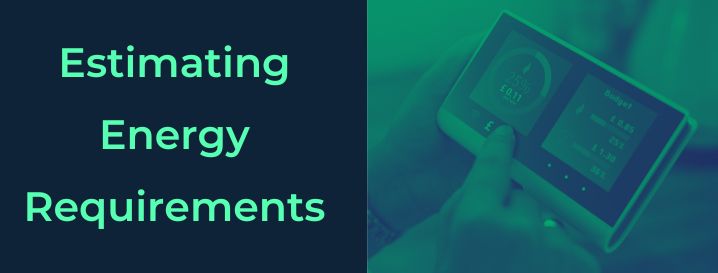
Thinking about investing in solar panels for your home? Good on you! But remember, it's not something you can just jump into without doing a bit of homework. You need to have a clear picture of your current energy consumption and when you're using most of your energy.
Also, keep in mind that life isn't always predictable. You might decide to go green with an electric car in the future, which will increase your energy needs.
So, before you take the plunge with solar panels, ensure you've got your sums right. Calculate your energy needs accurately, taking into account both your present and future consumption. After all, it's always better to be well-prepared than to find yourself in a pickle later on.
| Average Electricity Cost (p/kWh)[1] | House Size | Average Monthly Electricity Usage (kWh) | Approximate Solar Panel System Size (kW) | Estimated System Cost (£)[2] |
|---|---|---|---|---|
| 30p | Small | 300 | 2 | £5,000-£7,000 |
| 30p | Medium | 600 | 4 | £10,000-£14,000 |
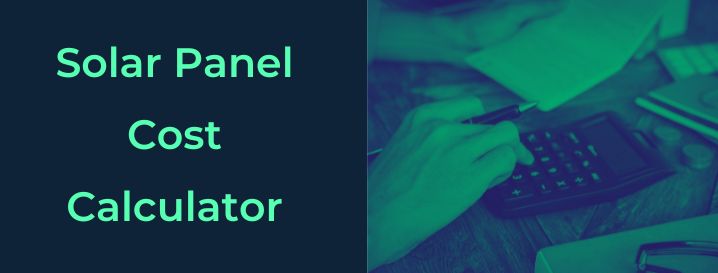
Mulling over going solar but the price has you scratching your head? A solar panels cost calculator might just be the ticket.
These handy online tools are like a personal finance whiz at your fingertips. They consider various factors like your energy usage, the size of your roof, and even where you hang your hat.
By simply popping in your specific details, these calculators can whip up an estimate of your solar panel installation costs quicker than you can say 'energy efficiency'.
So, just as you'd budget for a swanky new sofa or a summer holiday, a solar panels cost calculator can help you get a grip on the potential costs of solar panels for your home. Knowledge is power, after all!
Please note that the Solar Panel Cost Calculator is intended for estimation purposes only. While the calculator uses reasonable assumptions and adjustment factors, it may not reflect the exact cost or output of a real-world solar panel installation.
It is important to understand that the calculator's results are estimates and should not be used as the sole basis for making financial decisions.
Over time, the cost of solar panels has been dropping like a stone, making solar energy a real possibility for homeowners. It's a bit like the way smartphones became better and more affordable as technology advanced. Solar panels are now doing more for less, so you're getting more energy clout for your cash.
This race to the bottom in solar panel prices has been cheered on by a surge in household installations, government sweeteners, and the microgeneration certification scheme.
As a result, we're hearing more homeowners asking, "How much energy can solar panels knock out for my home?" It's clear there's a growing interest in the energy potential of these shiny panels.
With prices on the slide and efficiency on the up, there's never been a better time to throw your hat into the solar ring. It's like stumbling upon a cracking sale - only this one can supply a heap of energy for your home!
As more homes start harnessing the sun's energy with solar panels, demand shoots up. This rise in demand, coupled with technological leaps and bounds, triggers what are known as 'economies of scale'. Basically, it becomes less costly to roll out each solar panel, which then translates to lower price tags for consumers.
Add to that mix the Smart Export Guarantee. This scheme rewards you for any surplus electricity your solar panels cook up, ramping up the appeal of solar power for homeowners.
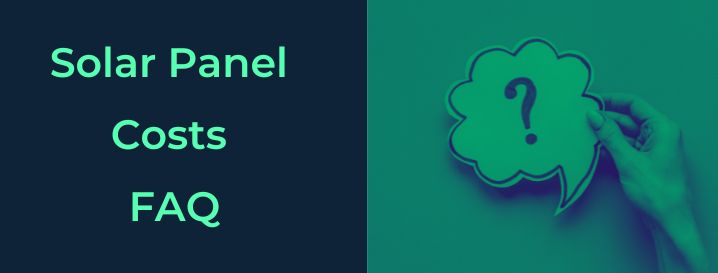
Now, let's put on our detective hats and tackle some commonly asked queries about solar panels, their price, installation, and the overall cost of a solar panel system. It's a bit like a Q&A session, but for solar energy. Ready?
Comparing prices from multiple suppliers and watching out for deals is a smart move if you're looking for cheap solar panels. Don't just focus on the panel costs; installation and upkeep are key too. Also, explore any government incentives or rebates, as they could greatly reduce your overall expenses.
Good news! The UK government's Spring Statement 2022 announced a VAT cut from 5% to zero on energy-efficient systems, including solar panels. In effect from April 2022 until 2027, this could mean over £1,000 in tax savings and over £300 annual energy bill savings for households. This applies to solar panel installations costing between £5,000 to £10,000.
Government studies show improving the Energy Performance Certificate rating could sell for about 14% more than comparable properties with lower ratings [1].
In fact, the UK government has a goal to upgrade all homes to an EPC rating of C by 2035 [4], so this could become increasingly important in the housing market.
Solar panels last between 25-30 years. But this can depend on a few factors, like weather conditions, how well you maintain them, and the quality of the panels themselves. Just like a car, regular cleaning and maintenance are important for keeping them running efficiently. And the cherry on top? Many manufacturers offer warranties that cover the lifespan of the panels, giving homeowners an extra layer of reassurance.
Curious about the average cost of fitting solar panels? In the UK, you're typically looking at around £5,000-£8,000. This figure depends on the system size, the type of panels, and the installation requirements. It includes the price of the panels, installation, and any extra components for the system.
The cost of solar panels has dropped by more than 70% over the past decade. Thanks to advancements in technology, growing demand, and government incentives, solar panels have become increasingly affordable.
It can be a sound investment, depending on your energy use, location, and long-term savings goals. Yes, there's an upfront cost for installation, but remember, solar energy is free and renewable, which can lead to savings on your electricity bills over time. Plus, solar panels can boost your home's value, giving it an edge if you decide to sell.